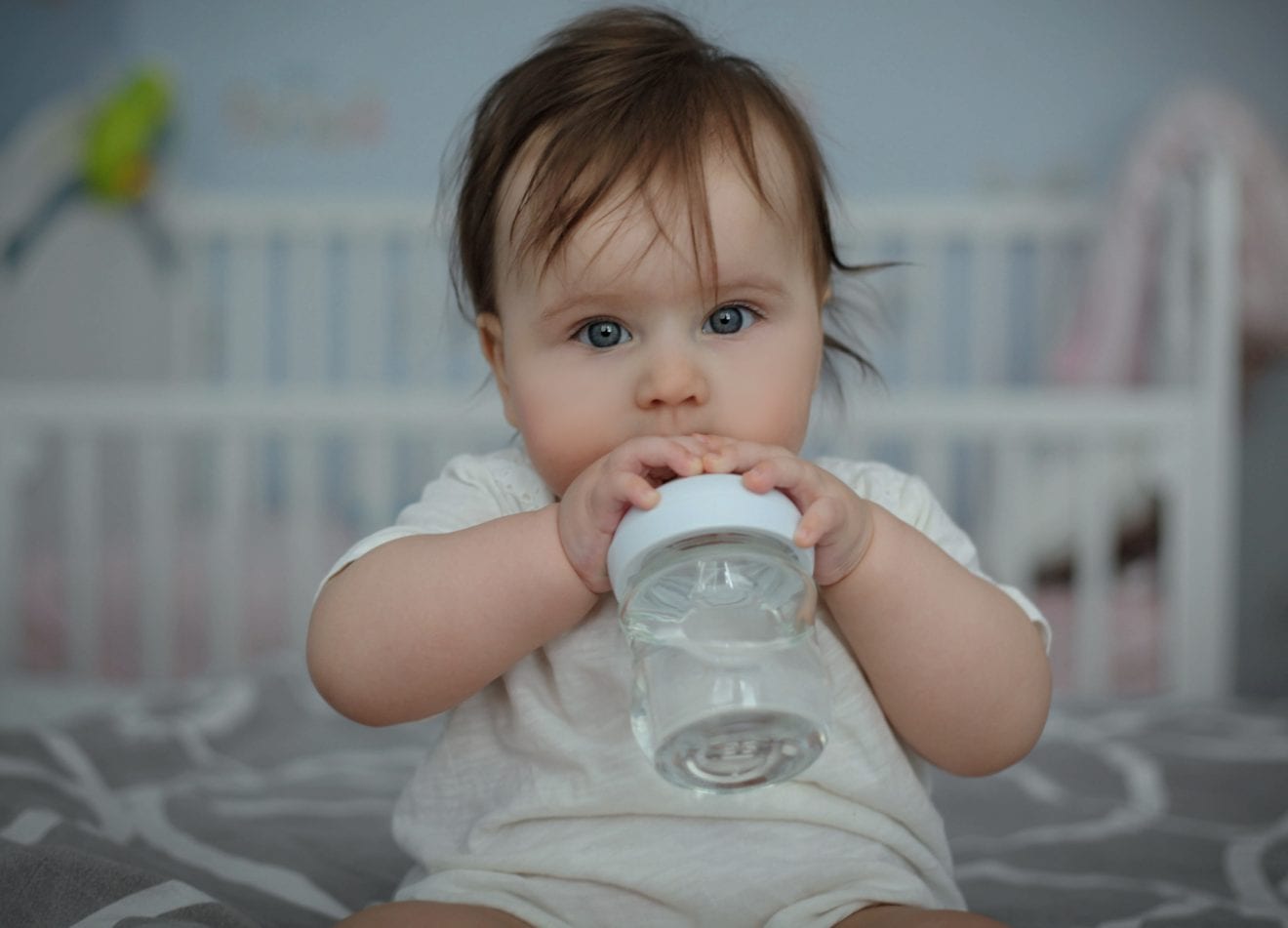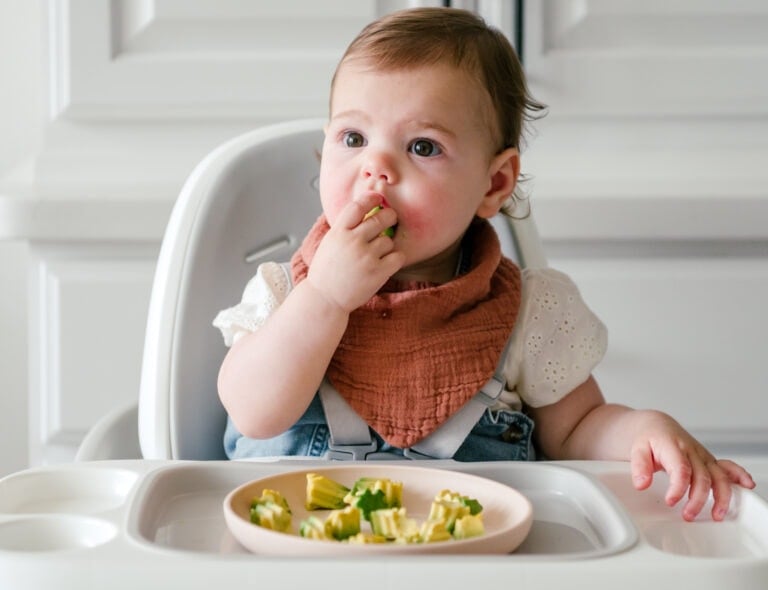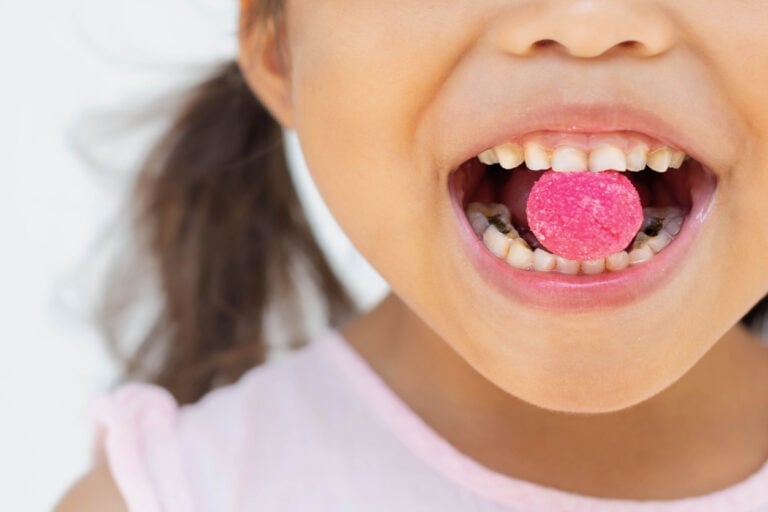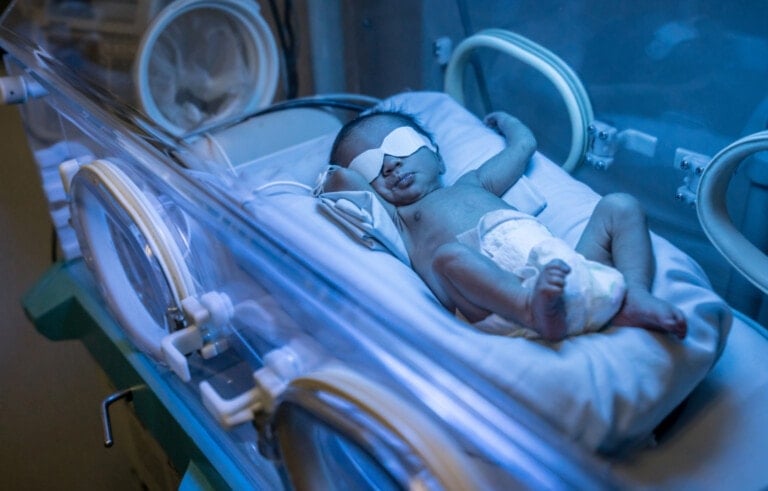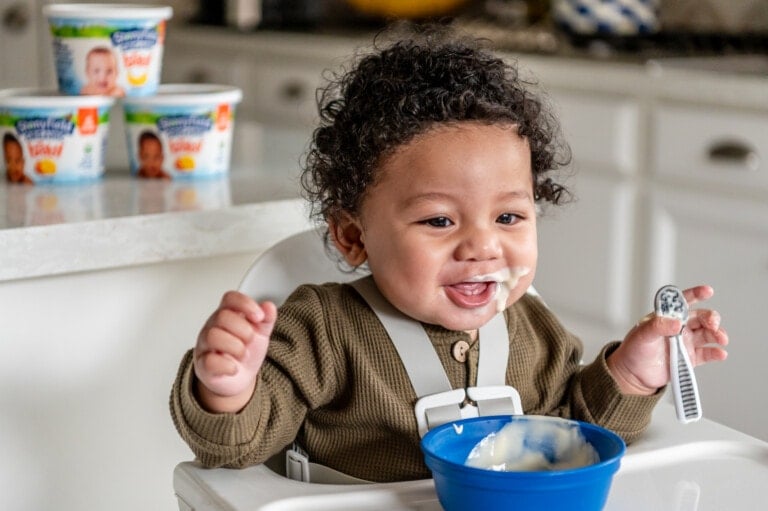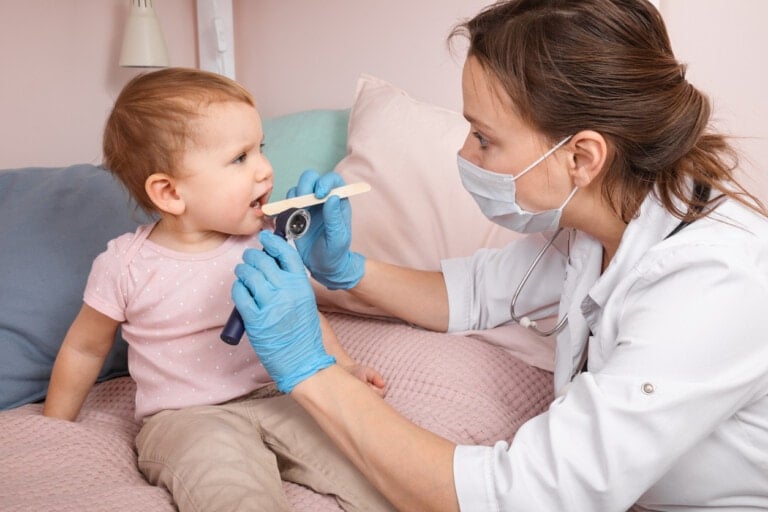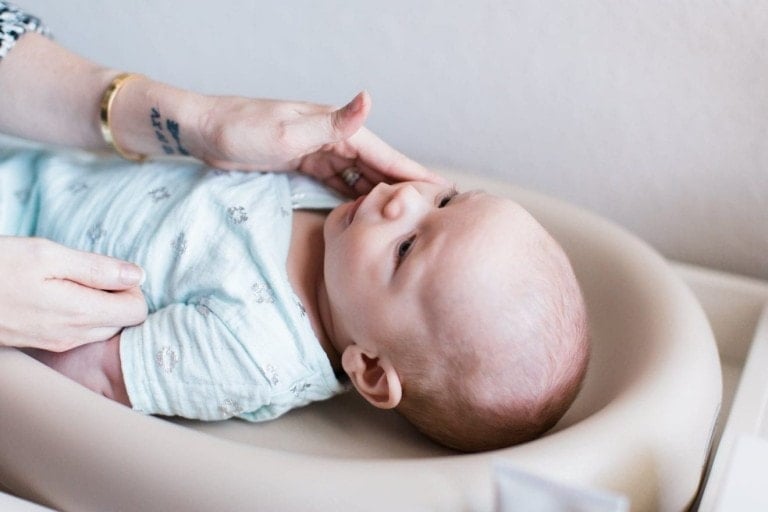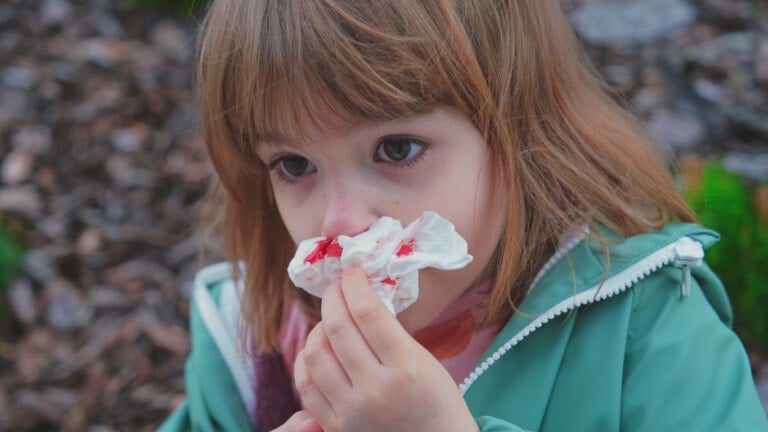If you’re anything like me, you always have your 40-ounce water bottle in hand and are obsessed with hydration. If this is the case, you might wonder how to keep your baby as hydrated as yourself. Can babies even drink water? How much water should they drink, out of what kind of vessel, and when can they start?! Here, we’ll discuss whether babies can drink water and how to keep them hydrated. We’ll also dive into how to introduce water to your baby and whether they can have any other beverages.
Can Babies Drink Water?
It may come as a surprise that young babies shouldn’t drink any water at all! Newborns should drink only breast milk or formula — no water. These milks provide the only hydration babies need, and any beverages other than breast milk or formula at this age can actually be harmful.1 Of course, there’s nothing inherently toxic in water. You can even use tap water to mix baby formula, but you should boil it first and then cool it for babies under 2 months old.3
Why Can’t Babies Have Water?
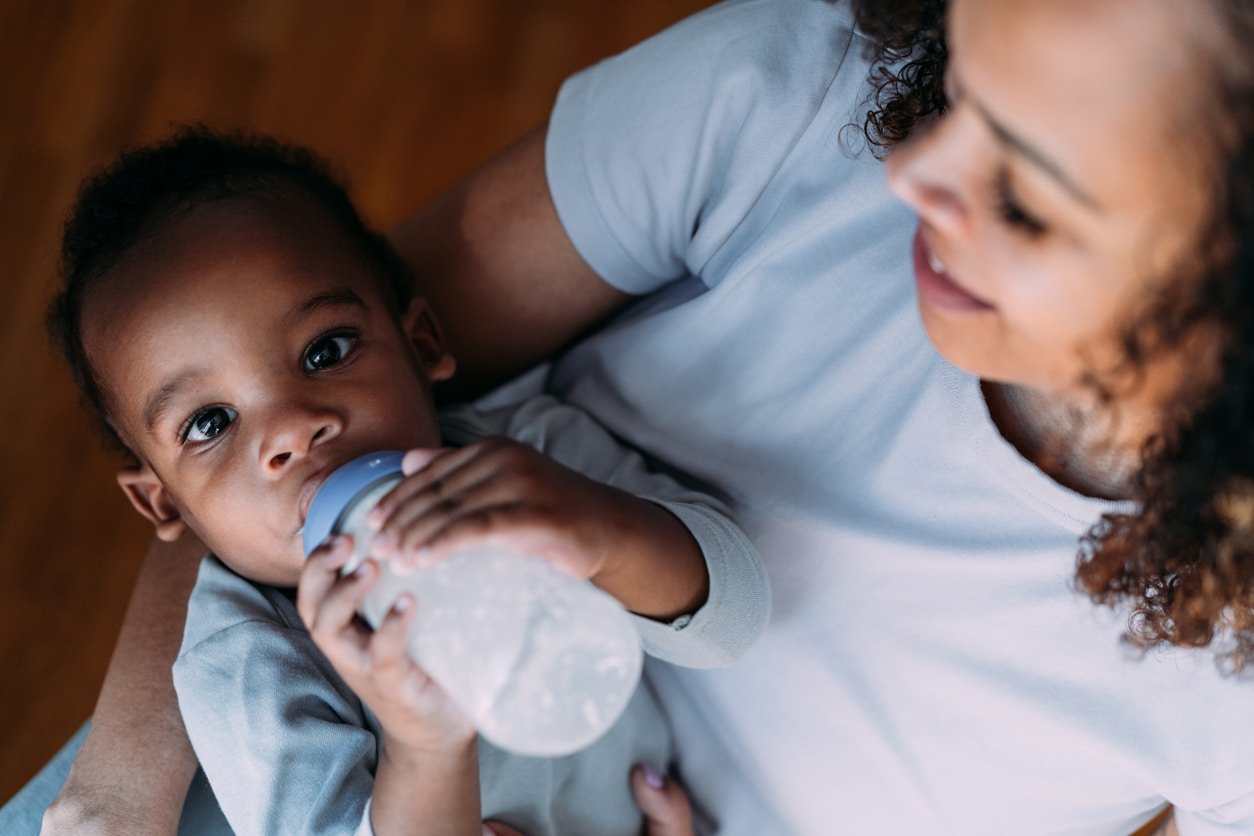
Breast milk and infant formula are perfectly formulated to give your baby the right balance of water, electrolytes, and calories. This helps them maintain the perfect hydration status and allows them to grow from the calories in their milk.1 Plain water offsets the hydration and nutrition balance in milk, potentially causing two main issues:
1. Malnutrition
Babies have very small stomachs — about the size of an egg.1 When babies have water, their little bellies may fill up on this calorie-free liquid instead of breast milk or formula. Then, they aren’t hungry for milk, potentially causing low blood sugar and poor weight gain.2
2. Water Intoxication
In addition to small stomachs, babies have very immature kidneys. Kidneys are the organs that filter our blood, maintain proper hydration status, and keep our electrolytes balanced. When a baby consumes water, the kidneys may be unable to keep up with peeing it out. If too much water remains in the blood, this dilutes the salt in the blood. An imbalance of salt in the blood because of too much water can cause seizures and brain damage.1
Other potential negative effects of infants drinking water include:2
- Impaired bonding
- Decreased breastfeeding duration
- Negative immune system effects
- Increased incidence of physiological jaundice
What Should Babies Drink if You’re Worried They’re Dehydrated?
Babies are very good at responding to their own hunger and thirst cues. They’ll eat and drink when they’re hungry and stop when they’re satisfied.4 It can’t hurt to offer your baby more milk if you’ve been in the heat and think they could use more fluids than usual. Breast milk contains about 87% water, and formula contains about 85% water, so these milks provide all the hydration and nutrition they need.1
Symptoms of dehydration in babies include:5
- Not producing tears when crying
- Having a sunken soft spot on top of their head
- Having a dry mouth
- A decreased number of wet diapers
If you suspect your baby is mildly dehydrated, offer them their normal breast milk or formula.5 If your baby has signs of severe dehydration, such as irritability, fatigue, or poor feeding, contact your pediatrician immediately. Depending on your baby’s age, they may advise continuing breastmilk or formula or using an oral rehydration solution, such as Pedialyte. But they’ll likely want to see your baby or have you take them to the emergency department to assess whether they need intravenous fluids.5
When Can Babies Have Water?
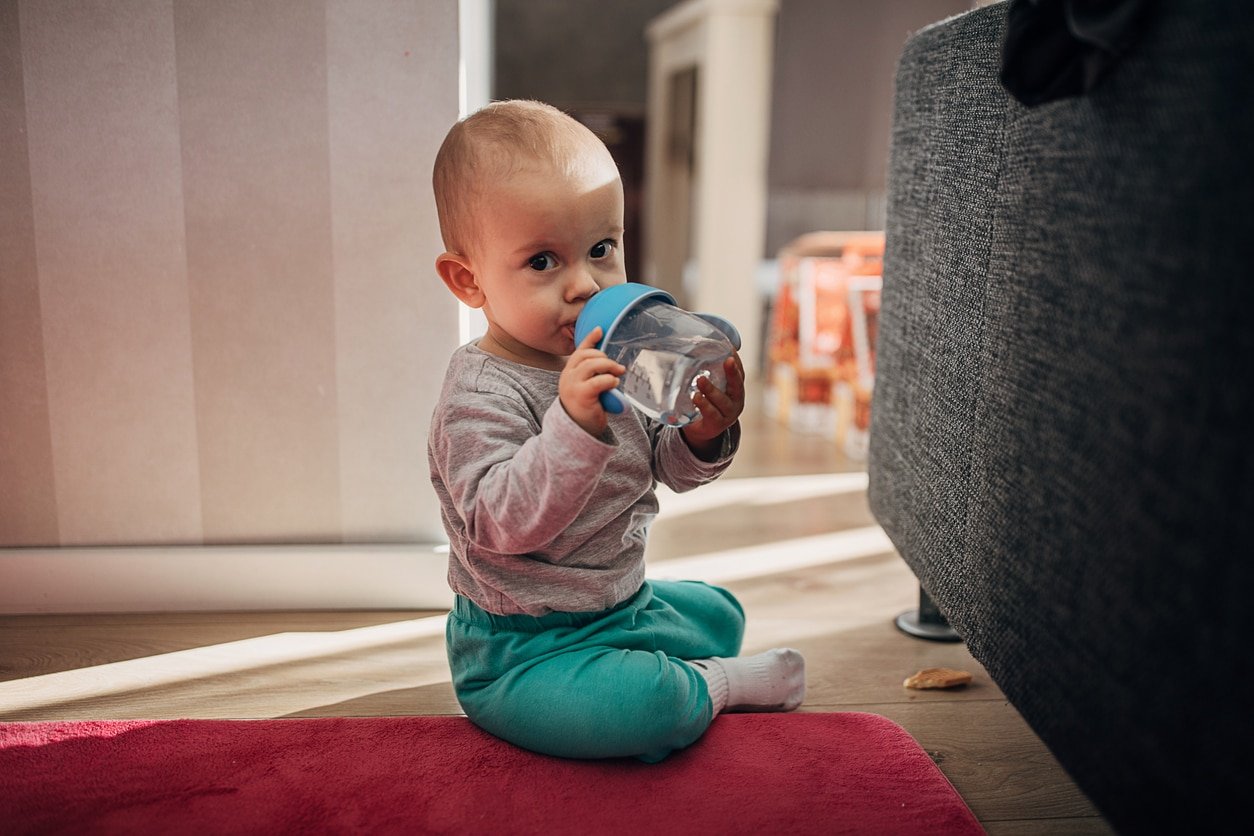
Babies can start having sips of water around 6 months of age. At this point, water is unlikely to replace much of their hydration. The purpose of introducing water at this age is to familiarize babies with drinking from different types of cups and get them accustomed to the taste.6 From 6-12 months, babies can have up to one 8-ounce cup of water per day. The volume of water they take in should gradually increase as they grow from 1-5 cups per day from ages 1-5.6
How To Introduce Water to Your Baby
Once your baby hits that six-month mark and you’re ready to introduce them to some water, here are some considerations:
1. Cup Choice
When offering water to your baby, you can use a straw cup, sippy cup, or open cup:6
Straw cup

I like the Munchkin weighted straw cups because of the soft silicone straw. Others recommend the Honey Bear water cup to teach a baby how to use a straw. However, there’s no need to purchase fancy products if they don’t fit your budget! Most grocery stores sell disposable straw cups that you can wash and reuse for the short time your children need them. Straw cups are an excellent choice because they’re healthier for your child’s teeth with long-term use.
Sippy cup
Some speech and occupational therapists advise against a regular sippy cup due to tongue positioning, swallow pattern, and speech and tooth development.7 However, the American Academy of Pediatrics still lists them as a transitional tool until your child can confidently drink from an open cup around age 2.8
Open cup

Teaching babies how to sip from an open cup is a great experience and lifelong skill.6 You may have to help baby at first, and there will be some spills, but I was surprised at how quickly my kids learned to use an open cup.
2. How Much Water To Give
Once you’ve chosen a cup for your baby, you need to know how much water to put in it. You can offer small volumes of water throughout the day for babies aged 6-12 months.1 The total volume of water for this age range can be as much as 4-8 ounces per day, but this can be spread throughout the day.6
3. When To Give Them Water
Although these small volumes of water are unlikely to displace the milk your baby consumes at this age, it may be best to offer your baby water with meals, as they’re likely to have started some solid foods around the same time.1 I always used drinking from a straw cup as a fun “activity” when my babies were over 6 months old. If you want to offer baby a few sips of water or have them practice drinking from a straw at other points throughout the day, the volume is so small that it shouldn’t make a difference.
When Can Babies Have Juice?

Once you’ve successfully found a cup for your baby and taught them how to drink water, you might be eager to introduce other beverages. However, you should avoid juice before age 1 because it provides sugar without any fiber. Once children get accustomed to drinking sweet-tasting juice, getting them to drink plain water can be difficult. Feeding whole fruit is preferable to serving juice, even if it’s 100% fruit juice.6 I know some parents who dilute fruit juice with water to make it less sweet.
At age 2, parents may decide to introduce small amounts of juice. The American Academy of Pediatrics recommends no more than 4 ounces a day for children between ages 2 and 3 and no more than 6 ounces per day for children ages 4 and up.6
When Can Babies Have Milk?
Parents who feed their babies formula will be happy to know they can introduce cow’s milk at 12 months of age.6 Talk to your pediatrician about how to wean your baby off formula and introduce plain cow’s milk.
After your baby has been solely drinking breast milk or formula as a newborn, introducing new food and drinks to your baby is an exciting activity. Watching them learn the new skill of drinking from a cup is funny and sweet! Just be sure to wait until 6 months to offer baby water, and wait at least one year before giving them cow’s milk.













